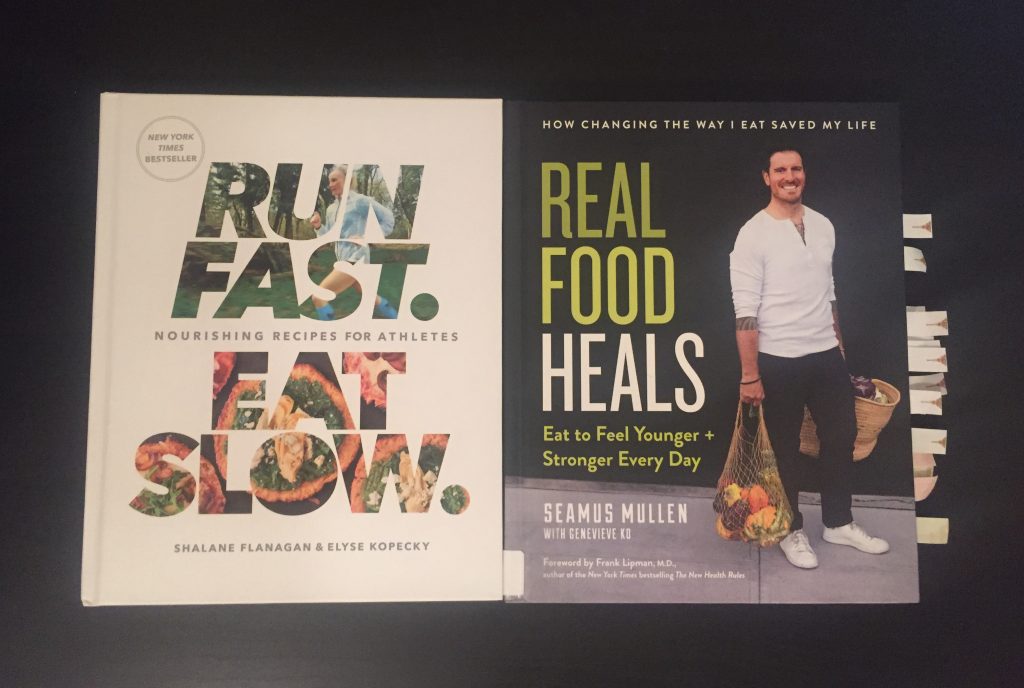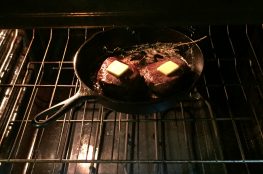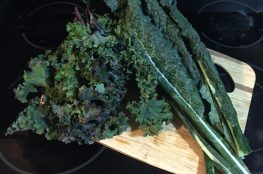Earlier this month I spent several posts exploring the notion of cooking without a recipe. But for those who are in need of some fresh inspiration and perhaps a little extra motivation to stay healthy in 2018, I’ve found two cookbooks worth highlighting.

The first of these, Seamus Mullen’s Real Food Heals (pictured on the right), is a great choice for anyone whose New Year’s resolutions include dietary goals such as Paleo or Whole 30, or for anyone who is simply trying to be more adventurous with meals. While it hasn’t been written in support of a particular dietary regimen, the author’s personal story of healing through food is both inspirational and in line with much of what you’ll find in other eating plans (and he also includes a reset eating plan of his own). His book has been a tremendous help in our kitchen as we’ve been experimenting with drastic cutbacks in the amount of refined carbs we consume, and my husband and I have gobbled up several of his recipes, particularly the Harissa Scallion Lamb Patties (p. 230) and Scrambled Eggs with Leeks, Squash, and Herbs (p. 171) with great enthusiasm. I appreciate that Chef Mullen’s writing is uncomplicated but informative, and I love the fact that most of the recipes are accompanied by full-page photos.
A few disclaimers about Real Food Heals: I checked out the Amazon ratings for this book and found two primary complaints, these being the frequent use of unusual ingredients and the (enormous) number of salads (which take up about 20% of the book). Personally, I think the salad section alone is worth the price of ownership, since the salads are delicious and the author includes a number of homemade dressings that I’d like to memorize and keep close at hand. I could eat the Fennel and Artichoke Salad (p. 39) several times a week, so long as I had canned artichoke hearts to work with (don’t get me started on my efforts to peel my own; I’ll post about that at some future date). That said, if you aren’t into salads then you are better off checking out the back of the book, where Chef Mullen has a very user-friendly section about meat, before deciding whether you want a copy.
As far as Chef Mullen’s ingredients went, I also did not see a problem here, but then again, I run a food blog. Part of the key to using this book lies in Googling things like “Jacobsen flake finishing sea salt,” which you not only aren’t likely to own but also aren’t likely to find at your local grocery store. If you take the time to do some quick research, you’ll figure out that finishing salt is different from other salts because it adds a crunch factor to things like salads (and isn’t going to overwhelm your plate like a last-minute pinch of table salt would do), but you can choose to leave it off if you don’t have any. Many of the ingredients Chef Mullen calls for fall into this category, where easy substitutions or outright omissions are possible; the rest of the dish is often complete enough that you probably won’t be complaining (after all, you can’t miss what you’ve never tasted!). Other ingredients, though perhaps less familiar, are often easy to find (chia seeds, kohlrabi, star anise). This probably isn’t the book to own if you are looking to make more mainstream food (for that, get one of these books instead), but if you’re like me and want to eat gourmet-style food without spending hours mastering French cooking techniques, this book offers a great place to start.
The second book I’m profiling today is actually a title I encountered in the fall and loved so much that my marathon-running, nutrition-studying sister bought me a copy for Christmas. Run Fast. Eat Slow.: Nourishing Recipes for Athletes has been featured everywhere from Time Magazine to Good Morning, America, and for good reason. If your New Year’s Resolution includes time at the gym or completing any sort of distance running, this is the book for you. Authors Shalane Flanagan (a four-time Olympian) and Elyse Kopecky (a trained chef whose background specifically includes health and nutrition) have teamed up to suggest delicious recipes that are specifically designed to provide the type of fuel and overall well-being that an athlete needs. Although the book is loosely organized according to meal type (breakfast/lunch/dinner/snacks/etc.), it also contains a useful appendix that refers readers to recipes specifically designed for needs like energy, recovery, pre-workout fuel, etc.
Among my own preferred recipes in this book are the Can’t Beet Me Smoothie (p. 28), which is oddly addictive given that I don’t think of myself as loving beets; and the Teff Pumkin Pancakes (p.44), which are like eating pumpkin bread for breakfast, only a lot healthier. I appreciate that the authors explain why each recipe is beneficial, because these explanations inspire me to both cook the meals I’m reading about and also to hit the trails with my puppy and my running shoes. It’s a lot easier to exercise when your workout gives you an excuse to eat something delicious.
Nutrient-dense food prepared well can be a fantastic motivator for health and a great source of ongoing energy. Both these books provide ample information to get you moving, both in the kitchen and out of it. So if your New Year’s resolutions are starting to seem stale, check out one or both of these titles to help you stay committed for the long haul.*
* See legal notice below.
Legal Notice:
Ditch The Ramen is a participant in the Amazon Services LLC Associates Program, an affiliate advertising program
designed to provide a means for us to earn fees by linking to Amazon.com and affiliated sites.


